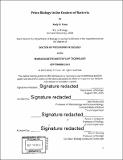| dc.contributor.advisor | Ann Hochschild abd Susan L. Lindquist. | en_US |
| dc.contributor.author | Yuan, Andy H. (Andy Han) | en_US |
| dc.contributor.other | Massachusetts Institute of Technology. Department of Biology. | en_US |
| dc.date.accessioned | 2018-05-17T19:06:58Z | |
| dc.date.available | 2018-05-17T19:06:58Z | |
| dc.date.copyright | 2015 | en_US |
| dc.date.issued | 2015 | en_US |
| dc.identifier.uri | http://hdl.handle.net/1721.1/115450 | |
| dc.description | Thesis: Ph. D., Massachusetts Institute of Technology, Department of Biology, 2015. | en_US |
| dc.description | Cataloged from PDF version of thesis. Vita. | en_US |
| dc.description | Includes bibliographical references. | en_US |
| dc.description.abstract | Prions are infectious amyloid aggregates first described in the context of mammalian neurodegenerative diseases collectively known as the transmissible spongiform encephalopathies. Prions have also been uncovered in yeast, where they function as protein-based units of heredity that confer unique phenotypic traits on those cells that harbor them. To date, the discovery of prions and prion-like phenomena has been confined to the Eukarya. The work presented in this thesis seeks to explore the possibility that prion-like mechanisms are operative in the bacterial domain of life. In what follows, we demonstrate that Escherichia coli cells can propagate a model yeast prion in a chaperone-dependent manner, establishing that the bacterial cytoplasmic milieu in general and a molecular machine in particular are poised to support protein conformation-based heredity in bacteria. Moreover, we provide evidence that a bacterial transcription termination factor exhibits prion-like behavior in E. coli and yeast. Our work thus suggests that bacterial prions exist and may function as previously unrecognized reservoirs of phenotypic diversity among the most abundant organisms on earth. | en_US |
| dc.description.statementofresponsibility | by Andy H. Yuan. | en_US |
| dc.format.extent | 141 pages | en_US |
| dc.language.iso | eng | en_US |
| dc.publisher | Massachusetts Institute of Technology | en_US |
| dc.rights | MIT theses are protected by copyright. They may be viewed, downloaded, or printed from this source but further reproduction or distribution in any format is prohibited without written permission. | en_US |
| dc.rights.uri | http://dspace.mit.edu/handle/1721.1/7582 | en_US |
| dc.subject | Biology. | en_US |
| dc.title | Prion biology in the context of bacteria | en_US |
| dc.type | Thesis | en_US |
| dc.description.degree | Ph. D. | en_US |
| dc.contributor.department | Massachusetts Institute of Technology. Department of Biology | |
| dc.identifier.oclc | 1035374734 | en_US |

